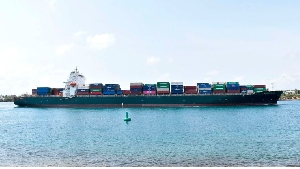The United Nations Conference on Trade and Development (UNCTAD) has raised concerns about escalating disruptions to trade which have resulted in a decrease in global trade volumes by 42 percent, with shipping rates surging by $500 in average container spot freight rates.
In a report released this week, the UN trade agency said recent attacks on ships in the Red Sea, along with geopolitical tensions affecting shipping in the Black Sea and the impacts of climate change in the Panama Canal, have created a crisis in the key trade routes.
UNCTAD's February 2024 report titled Navigating Troubled Waters, shows that the Suez Canal handled 12 percent -15 percent of global trade in 2023, as most ships re-routed and others suspended operations due to attacks by Yemen’s Houthi rebels.
The Suez Canal, a key waterway connecting the Mediterranean Sea to the Red Sea, has remained a big worry for shippers, resulting in the rerouting of the vessels to a longer route of over 1,300km through Southern Africa.
“Weekly container ship transits have fallen by 67 percent. Tanker transits and gas carriers have also seen major declines,” the report said.
The UN agency also stated the ongoing war in Ukraine and its impact on the Black Sea have triggered major shifts in the oil and grain trade.
“The $500 surge in average container spot freight rates during the last week of December was the highest-ever weekly increase. Average container shipping spot rates from Shanghai have more than doubled (up 122 percent) since early December. Rates from Shanghai to Europe have more than tripled (up 256 percent). Rates to the US west coast increased by 162 percent,” the report added.
The Suez Canal is a major source of foreign currency revenue for Egypt, contributing $9.4 billion in the fiscal year 2022/23, about 2.3 percent of the country’s gross domestic product (GDP).
The Red Sea crisis has reportedly triggered a 40 percent drop in Suez Canal revenues. A deteriorating situation in Egypt could have spillover effects on other countries in the region, such as Ethiopia and Sudan.
In other shipping markets, more oil tankers are now re-routing through the Cape of Good Hope. The number of specialised car-carrying ships using the Red Sea dropped by more than half in December 2023, compared to December 2022. Shippers Council of Eastern Africa head of policy and advocacy Agayo Ogambi said the ongoing attacks have disrupted the supply chain, as it is taking longer to deliver cargo.
“For Kenyan exports such as tea, we are taking longer to deliver, considering the routes are no longer safe. The vessels have to take a longer route or hire security for safe passage, which will delay supplies and add costs,” said Mr Ogambi.
“We are in a difficult situation, and this will need both political and military interventions to resolve the crisis.”
Kenya Ships Agents Association (KSAA) also said there are new sea freight charges as a result of increasing insecurity caused by the Houthis.
KSAA chief executive Juma Ali Tellah said shippers are concerned about the escalating conflict along the Suez Canal route, and its potential repercussions on businesses in East Africa.
“Major shipping lines are responding by rerouting vessels around the Cape of Good Hope, a costly alternative that directly impacts the business community and consumers in East Africa,” Mr Tellah said.
He said the attacks will have long-term effects on the freight business, considering the delay in the reshipment of empty containers.
“We have experienced a reduction of ships leading to a reduction in ships’ capacity and a reduction in container availability, along with a potential for an increase in insurance costs and liability for ship owners and insurers,” he said.
Africa News of Monday, 26 February 2024
Source: theeastafrican.co.ke

















